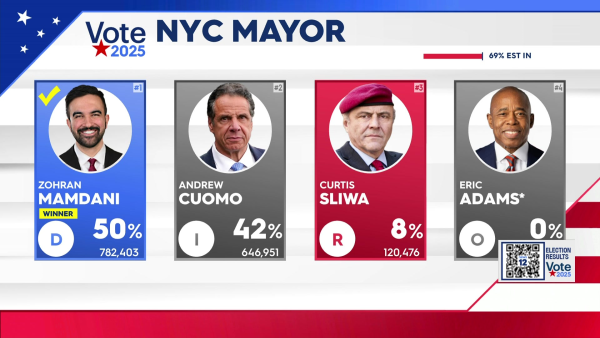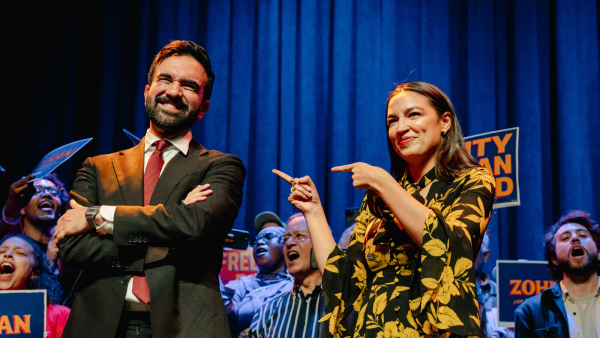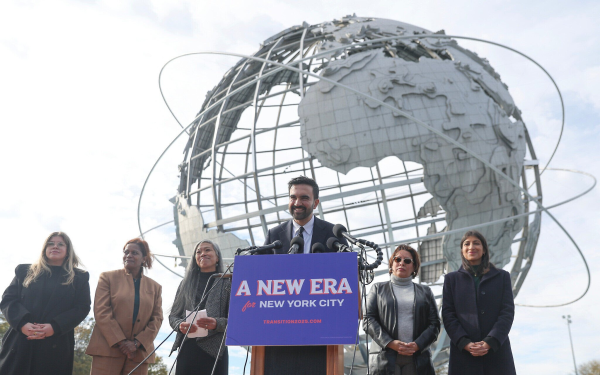【文/观察者网 摩根】
纽约市长选战爆出冷门--34岁的民主社会主义者佐赫兰·马姆达尼以黑马之姿击败前州长安德鲁·科莫,这场胜利在进步派阵营引发狂欢。
马姆达尼的草根运动点燃了年轻选民的激情,这群人早已对民主党的"陈词滥调"深感厌倦。数据显示,25至35岁选民投票率创下纪录,成为助推他胜选的关键力量。在伯尼·桑德斯和亚历山德里娅·奥卡西奥-科尔特斯(AOC)等左翼明星站台下,这位州议员的逆袭被舆论称作"社会主义冲击波",标志着民主党极左翼正式登上权力舞台。
支持者欢呼这场胜利是对激进改革的民意授权,马姆达尼不仅将成为纽约首位千禧一代市长,更预示着民主党领导层的世代更替已成定局。

马姆达尼以绝对优势胜选纽约市市长,第二名是特朗普和马斯克背书的科莫
从租金管制、免费公交到市营超市和托儿服务,马姆达尼的政纲兼具理想与现实色彩。作为纽约史上首位穆斯林兼南亚裔市长,他的当选更添历史意义。竞选集会上,年轻支持者为他"打造可负担的公平城市"的承诺沸腾,AOC现场疾呼:"特朗普时代终将过去,未来属于我们!"这般左翼思潮席卷年轻世代的场景,在数年前的纽约政坛难以想象。但2025年,马姆达尼力克政治世家出身的中间派大佬科莫,让民主党左翼终于迎来扬眉吐气的时刻。
对特朗普主义的重击
马姆达尼的胜利同样是对特朗普主义的战略打击。虽然宪法禁止特朗普在2028年再次参选,但他已公开流露出挑战常规、试图重掌权力的想法。为此,他需要营造民主党混乱无序、脱离民众且内斗不休的形象。马姆达尼的胜选打破了这种叙事。他的竞选证明,大胆的进步理念能够大规模动员选民,尤其是在被两党长期忽视的工人阶级、移民和年轻群体中。
特朗普在最后关头亲自背书科莫,甚至敦促共和党人柯蒂斯·斯利瓦退选。包括埃隆·马斯克在内的主要共和党捐助者和保守派人物也支持投向科莫,指望一个中间派民主党人比社会主义"造反派"更易击败或控制。他们的赌注失败了。马姆达尼不仅突破了这种两党联合封锁,更击碎了"社会主义者无法当选"的政治迷思。
影响已超越纽约。马姆达尼的成功为民主党提供了一份重生攻略:动员不满者,清晰阐述阶层议题,联合被遗忘者构建联盟。若此模式在其他州市复制,将打乱共和党2026年中期选举的战略部署。被更年轻的社会主义候选人激发出活力的民主党基本盘,可能侵蚀特朗普在摇摆选民中的吸引力,并分裂其联盟。
这种分裂构成多重威胁:首先,那些过去可能因幻灭或经济困境倒向右翼民粹主义的年轻工薪阶层选民,如今在左翼看到了可信的替代选择;其次,马姆达尼的胜利为民主社会主义运动注入了氧气,不仅吸引草根组织者,也吸引了寻求领导层诚信与清晰的独立和温和派选民;第三,它迫使共和党不得不防守其原本希望翻转的郊区和城市选区,尤其是在宾夕法尼亚、亚利桑那和佐治亚等州,那里不断上涨的生活成本正使左翼经济民粹主义更具吸引力。
若马姆达尼的胜利激励类似候选人在关键摇摆州参选并获胜,共和党可能会发现其基本盘被拉向两个方向:一个朝向特朗普式的诉苦政治,另一个朝向政策驱动的工薪阶层诉求。曾帮助特朗普在2024年重返白宫的团结,可能在这场新兴的反制运动的重压下分崩离析。共和党捐助者已在党派方向问题上产生分歧,马姆达尼的胜利引发了人们对2026年选战的担忧:面对一个重焕活力、具有阶级意识、由青年领导的民主党革新力量,共和党的宣传机器可能失灵。
2026年中期选举对特朗普主义尤为关键,因为国会两院的控制权将决定特朗普任期后半段的立法环境。若民主党重新控制任一议院,他们将有能力拖延或阻挠特朗普的议程。民主党掌控的众议院可发起调查、举行听证会并限制关键政策的资金;民主党掌控的参议院可阻挠司法任命和内阁提名,从而使特朗普的执政陷入瘫痪。共和党失去的席位越多,特朗普的立法联盟就越脆弱。
马姆达尼的胜利标志着进步势头正在高涨,这可能影响竞争激烈的选区,使2026年选举不再仅仅是对特朗普领导力的公投,更是一场不同未来图景的角逐:一个植根于民粹主义的怨愤,另一个植根于经济变革。
建制派与革新派:民主党的内部角力
马姆达尼的爆冷胜出远不止是迎来一位新市长--它暴露了其与科莫之战所象征的"民主党深层分裂"。他们的冲突近乎戏剧化地凸显了党内建制派与崛起左翼的对立,或者如科莫所言,民主党内部正在上演一场"安静的內战"。一方是以67岁的科莫为代表的温和派与传统权力掮客,另一方则是34岁的马姆达尼等社会主义革新派,他们代表更年轻、更激进的群体。

马姆达尼和AOC
这既是意识形态也是代际的分歧:许多老一辈民主党人认为马姆达尼(以及AOC等领袖)过于激进且缺乏经验,背负"过多意识形态包袱";而年轻进步派则视科莫这样的建制派老将为疲软、道德妥协的中间主义化身,无法有效对抗共和党右翼。
"这不再是我父亲的那个民主党,不是比尔·克林顿的民主党,也不是巴拉克·奥巴马的民主党,"科莫近期哀叹道,对党的左转表示不满,"这是一个社会主义政党。若不加制止,这将是民主党的末日。"
科莫确实警告过,民主党正"在其内部分歧的重压下崩溃",温和派与社会主义者之间的内战可能使其分崩离析。在他看来,党内领袖已"迷失身份",花更多时间指望特朗普"犯错",而非提出对未来大胆的愿景。这场党内斗争在纽约选战中暴露无遗:马姆达尼赢得民主党提名后,党内建制派大多与他保持距离。
值得注意的是,参议院多数党领袖查克·舒默--建制派的实际领袖--明确拒绝为本党候选人马姆达尼背书。(舒默的犹豫很可能源于马姆达尼毫不掩饰的左翼立场,例如他对以色列政策的猛烈批评--这些立场让许多中间派民主党人感到不安。)与此同时,AOC等知名进步派人士力挺马姆达尼,巩固了民主党年轻一派公开反抗元老派的态势。
击败特朗普主义的民主党左翼力量正在积聚
这场代际拉锯战紧随民主党在国家层面遭遇的沉重失败。2024年,美国人目睹了两位八旬老人的总统对决--而民主党人输了。唐纳德·特朗普在2024年赢得连任,因为民主党选民最终拒绝了由另一位年长提名人所代表的现状。这场选举被广泛视为民主党后继无人:当乔·拜登在辩论中的失态加剧了人们对党领袖过于年老、脱离实际的观感时,甚至一些忠诚的民主党人也感到尴尬。
此后,民主党的身份危机一直在酝酿。许多基本盘选民并非倒向共和党,而是在期待能回应其诉求的新领导层和令人信服的愿景。在此背景下,年轻进步派明星的崛起给一些民主党人带来了新希望。民主党有理由对未来感到乐观。马姆达尼和AOC等领袖正在证明,大胆的左翼理念能够激发选民的活力。
纽约的分裂是全国局势的缩影。正如马姆达尼的竞选所主张的,科莫式的中间主义政治无法击败特朗普主义,全国许多活动家相信,民主党必须规划一条大胆的新路线,以激励选民并对抗右翼的吸引力。拥有宏大理念的年轻领袖--如36岁的AOC--被视为更有能力应对特朗普时代共和党策略的民主党领袖。
有迹象表明,这一转变已在进程中。全美范围内,老一辈民主党议员退休潮正为下一代创造机会。受马姆达尼获胜的激励,进步派新人在美国各地胜选。AOC及其同僚若能驾驭纽约展现出的草根能量,将有望主导民主党的未来。在马姆达尼的胜选集会上,AOC关于后特朗普时代"属于我们"的号召不仅是庆祝之辞,更传递出火炬正在交接的明确信息。
若民主党要找到重振之路,这条由拒绝按资排辈的年轻领袖们开辟的道路很可能就是答案。一场深刻的代际更替舞台已经搭好--这可能会在未来几年重新定义民主党。
社会主义治理能否在美国大都市奏效?
如果说马姆达尼的崛起代表着一场代际转变,那么他的下一项挑战就是将青年的热情转化为有效的治理。热情的"蜜月期"很快将让位于来自赋予他权力的选民的审视。纽约是一座既充满躁动青年又盘踞着根深蒂固财富阶层的城市,人们将密切关注马姆达尼的民主社会主义议程能否在不大幅削弱城市经济活力的前提下,带来真正的变革。他的成败不仅将塑造纽约的未来,更将检验进步主义治理能否在美国大都市真正奏效。
在国家层面,政治氛围也在转变。正如特朗普在马姆达尼胜选后所言,"美国人现在面临一个选择--在真理与常识之间。"但马姆达尼的胜利已改写了这一选项。社会主义在美国不再是负面词汇--它已成为全国性对话的一部分。纽约选民选出的不只是一位市长;他们拓宽了美国政治想象力的边界。
尽管由于出生在乌干达,从宪法上讲他没有资格竞选总统,但马姆达尼的理念和影响力仍可能塑造民主党在全国的方向,并影响将推动其运动向前发展的下一代领导人。

胜选之后,马姆达尼发表演讲
在选举之夜,面对皇后区欢呼的人群,马姆达尼将焦点直指特朗普主义及其反对力量。"要让特朗普主义的房东们承担责任。让亿万富翁们承担责任。与工会站在一起,扩大劳工保护"。他宣称,"当劳动者拥有铁一般的权利时,企图剥削他们的老板就会变得渺小。纽约将始终是一座属于移民、由移民建设、靠移民驱动的城市--而从今晚起,将由一位移民领导"。
接着,在他演讲中已被许多人视为定义性时刻的一幕中,他微笑着停顿片刻,补充道:
"是的,我很年轻。我是穆斯林。我是民主社会主义者。而最'要命'的是--我拒绝为此作出任何道歉。"
(翻页查看英文版)
Mamdani "The Socialist Shockwave"
The New Face of the Democrats: What Mamdani's Victory Means for 2026
A wave of euphoria swept through progressive circles as Zohran Mamdani, a 34-year-old democratic socialist, clinched a stunning victory over former Governor Andrew Cuomo in New York City's mayoral race. Mamdani's grassroots campaign energized young voters who had long seen the Democrats as "stale and tired," with the turnout highest among 25-35 year-olds - a sign of youthful enthusiasm powering his win. Backed by prominent left-wing figures like Senator Bernie Sanders and Rep. Alexandria Ocasio-Cortez (AOC), the young assemblyman's insurgent run toppled a party elder in what many are calling a "socialist shockwave" that handed power to the Democrats' far-left flank. His victory, celebrated by supporters as a mandate for bold change, not only makes Mamdani the first millennial mayor of America's largest city - it also signals a broader changing of the guard within the Democratic Party.
Mamdani's platform - from rent freezes and free public transit to city-run grocery stores and childcare - and his status as the first Muslim and South Asian mayor of NYC, imbued the race with a historic, celebratory vibe. Crowds at his rallies were electrified by his calls to make the city more affordable and just, with AOC herself exhorting young New Yorkers that "there has been a day before [Trump's] presidency, and there will be a day after. And it belongs to us." Such scenes of jubilant, youthful supporters embracing a democratic socialist agenda would have been unthinkable in the city's establishment politics a few years ago. Yet in 2025, Mamdani's win over a well-known centrist like Cuomo - a scion of one of New York's storied political families - has given the left wing of the party a moment to rejoice and claim momentum for a new generation.
A Blow to Trumpism
Mamdani's victory is also a strategic setback for Trumpism. Donald Trump, though constitutionally barred from running again in 2028, has openly flirted with the idea of defying norms and attempting a return to power. To do so, he needs a Democratic Party perceived as disorganized, out of touch, and riddled with infighting. Mamdani's win disrupts that narrative. His campaign showed that bold progressive ideas can mobilize voters at scale, particularly in working-class, immigrant, and youth-heavy constituencies often ignored by both parties.
Trump personally endorsed Andrew Cuomo in a last-ditch effort to block Mamdani, even urging Republican Curtis Sliwa to drop out. Leading Republican donors and conservative figures, including Elon Musk, threw their support behind Cuomo, hoping that a centrist Democrat would be easier to beat or control than a socialist insurgent. Their gamble failed. Mamdani not only overcame this bipartisan blockade, but he also revealed cracks in the narrative that socialism is unelectable.
The implications go beyond New York. Mamdani's success offers a playbook for a revitalized Democratic Party: mobilize the disaffected, speak clearly about class, and build coalitions of the left-out. If this model is replicated in other cities and states, it could complicate the GOP's 2026 midterm election strategy. A reinvigorated Democratic base, energized by younger socialist candidates, may erode Trump's appeal among swing voters and fracture his coalition.
This fracture poses multiple threats. First, younger working-class voters who might have drifted toward right-wing populism in the past-out of disillusionment or economic desperation-are now seeing credible alternatives on the left. Second, Mamdani's win gives oxygen to the Democratic Socialist movement, attracting not only grassroots organizers but also independent and moderate voters looking for integrity and clarity in leadership. Third, it pressures the GOP to defend suburban and urban districts it had hoped to flip, especially in states like Pennsylvania, Arizona, and Georgia, where rising costs of living are making leftist economic populism more attractive.
If Mamdani's win inspires similar candidates to run-and win-in battleground states, the GOP may find its base pulled in two directions: one toward Trump-style grievance politics, the other toward policy-driven working-class appeals. The unity that helped Trump return to office in 2024 could splinter under the weight of this emerging counter-movement. With Republican donors already divided over the direction of the party, Mamdani's victory raises the spectre of a 2026 cycle where GOP messaging falters in the face of a rejuvenated, class-conscious, youth-led Democratic insurgency.
The 2026 midterms are particularly critical for Trumpism because control of Congress-both the House of Representatives and the Senate-will determine the legislative environment for the second half of Trump's term. If Democrats regain control of either chamber, they will have the power to stall or block Trump's agenda. A Democratic House could launch investigations, hold hearings, and restrict funding for key policies. A Democratic Senate could block judicial appointments and cabinet nominations, effectively paralyzing Trump's governance. The more seats Republicans lose, the more fragile Trump's legislative coalition becomes. Mamdani's victory signals a rising tide of progressive momentum that could help tip competitive districts, making the 2026 election less a referendum on Trump's leadership and more a contest between competing futures: one rooted in populist grievance, the other in economic transformation.
Old Guard vs. New Guard: Democrats' Internal Struggle
Mamdani's upset did more than install a new mayor - it laid bare the "deep Democratic Party divide" that his battle with Cuomo came to symbolize. In almost cartoonishly stark terms, their clash pitted the party's old guard versus its rising left wing, or as Cuomo himself put it, a "quiet civil war" raging among Democrats. On one side stand the moderates and traditional power-brokers - exemplified by 67-year-old Cuomo - and on the other, insurgent socialists like Mamdani, 34, who represent a younger, more radical cohort. It is a divide both ideological and generational: many older Democrats view figures like Mamdani (and by extension leaders like AOC) as too radical and untested, carrying "too much ideological baggage," while younger progressives see establishment veterans like Cuomo as the embodiment of an exhausted, morally compromised centrism that can't effectively beat the Republican right. "That is not my father's Democratic Party. It's not Bill Clinton's Democratic Party. It's not Barack Obama's Democratic Party," Cuomo lamented recently, bemoaning the party's leftward lurch. "This is a socialist party. It would be the death of the Democratic Party" if unchecked.
Indeed, Cuomo has warned that the Democratic Party is "imploding under the weight of its own divisions," with a civil war between moderates and socialists threatening to tear it apart. From his perspective, party leaders have "lost their identity" and spend more time banking on Trump "making a mistake" than offering a bold vision for the future. This intraparty struggle was on full display in the NYC race: after Mamdani surged to the Democratic nomination, much of the party establishment kept him at arm's length. Notably, Senate Majority Leader Chuck Schumer - de facto leader of the old guard - pointedly declined to endorse the Democratic nominee, Mamdani. (Schumer's hesitation likely stemmed from Mamdani's unabashedly left-wing stances, such as his fierce criticism of Israel's policies - positions that made many centrist Democrats uneasy.) Meanwhile, prominent progressives like AOC rallied behind Mamdani, solidifying the sense that the Democratic Party's youth wing was in open rebellion against its elders.
National Implications and the Road Ahead
This generational tug-of-war comes on the heels of a sobering defeat for Democrats at the national level. In 2024, Americans witnessed a presidential contest between two octogenarian candidates - and the Democrat lost. President Donald Trump won a second term in 2024, as Democratic voters ultimately rejected the status quo represented by another elderly nominee. The election was widely seen as an age problem for the party: even some loyal Democrats cringed as Joe Biden's debate stumbles reinforced perceptions that the party's leadership was too old and out of touch.
In the aftermath, a Democratic identity crisis has been brewing. Many in the base aren't defecting to Republicans; rather, they're holding out for fresh leadership and a compelling vision that speaks to their needs. Against this backdrop, the rise of young progressive stars is giving some Democrats new hope. For Democrats, there are reasons to feel optimistic about the future. Leaders like Mamdani and AOC are proving that bold left-wing ideas can energize voters.
The split in New York offers a microcosm of what's happening nationally. Just as Mamdani's campaign argued that Cuomo's brand of centrist politics was incapable of defeating Trumpism, many activists nationwide believe the Democratic Party must chart a bold new course to inspire voters and counter the right's appeal. Younger leaders with big ideas - like AOC at 36 - are seen as better suited to take on Trump-era Republican tactics.
There are signs that this transition is already underway. Across the country, a wave of retirements by aging Democratic lawmakers is creating openings for the next generation. Progressive newcomers are winning races in diverse corners of America, often inspired by the same frustrations and ideals that propelled Mamdani. Alexandria Ocasio-Cortez and her cohort are poised to champion the Democratic Party's future if they can harness the grassroots energy on display in New York. At Mamdani's victory rally, AOC's rallying cry that the post-Trump era "belongs to us" was more than celebratory rhetoric. It was a pointed message that the torch is being passed.
Can Socialist Governance Work in New York?
If the Democrats are to find their way out of the wilderness, it may well be on the path blazed by these younger leaders who refuse to wait their turn. The stage is set for a profound generational changing of the guard - one that could redefine the Democratic Party in the years to come.
If Mamdani's rise represents a generational shift, his next challenge will be turning youthful energy into effective governance. The "honeymoon period" of enthusiasm will soon give way to scrutiny - from the very voters who put him in power. New York, a city defined by both its restless young and its entrenched wealthy, will be watching closely to see whether his socialist agenda can deliver real change without undermining the city's economic vitality. His success or failure will not only shape the city's future but will test whether progressive governance can truly work in America's great urban centres.
At the national level, the political atmosphere is also shifting. As Donald Trump said in his post-election remarks, "Americans now face a choice - between truth and common sense." But Mamdani's victory has already rewritten that choice. Socialism is no longer a negative word in America - it's part of the national conversation. The voters of New York didn't just elect a mayor; they expanded the boundaries of what American politics can imagine.
Though constitutionally ineligible to run for president because he was born in Uganda, Mamdani's ideas and momentum could yet shape the Democratic Party's national direction - and influence the next generation of leaders who will carry his movement forward.
On election night, standing before a roaring crowd in Queens, Mamdani turned his focus squarely toward Trumpism and the forces that opposed him. "Hold Trumpist landlords to account. Hold billionaires to account. Stand with unions and expand labour protections," he declared. "When working people have ironclad rights, the bosses who seek to exploit them grow small. New York will remain a city of immigrants, built by immigrants, powered by immigrants - and as of tonight, led by an immigrant."
Then, in what many are already calling the defining moment of his speech, he smiled, paused, and added:
"Yes, I am young. I am Muslim. I am a democratic socialist. And most damning of all - I refuse to apologize for any of it."











